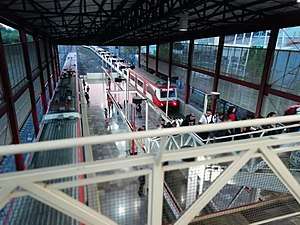Lechería station
Lechería is a station serving the Ferrocarril Suburbano, a suburban rail that connects the State of Mexico with Mexico City. The station is located in the municipality of Tultitlán, State of Mexico, north of Mexico City.[1]
| Commuter rail | ||||||||||||||||||||||||||||||||||||||||||||||||||||||||||||||||||||||
 | ||||||||||||||||||||||||||||||||||||||||||||||||||||||||||||||||||||||
| Location | Tultitlán, State of Mexico Mexico | |||||||||||||||||||||||||||||||||||||||||||||||||||||||||||||||||||||
| Coordinates | 19°35′57.0″N 99°11′12.6″W | |||||||||||||||||||||||||||||||||||||||||||||||||||||||||||||||||||||
| Owned by | Ferrocarriles Suburbanos | |||||||||||||||||||||||||||||||||||||||||||||||||||||||||||||||||||||
| Operated by | Ferrocarriles Suburbanos | |||||||||||||||||||||||||||||||||||||||||||||||||||||||||||||||||||||
| Platforms | 1 island platform | |||||||||||||||||||||||||||||||||||||||||||||||||||||||||||||||||||||
| Tracks | 2 | |||||||||||||||||||||||||||||||||||||||||||||||||||||||||||||||||||||
| Connections | Mexibús Lechería | |||||||||||||||||||||||||||||||||||||||||||||||||||||||||||||||||||||
| Construction | ||||||||||||||||||||||||||||||||||||||||||||||||||||||||||||||||||||||
| Structure type | Surface | |||||||||||||||||||||||||||||||||||||||||||||||||||||||||||||||||||||
| Disabled access | Yes | |||||||||||||||||||||||||||||||||||||||||||||||||||||||||||||||||||||
| History | ||||||||||||||||||||||||||||||||||||||||||||||||||||||||||||||||||||||
| Opened | 2 June 2008 | |||||||||||||||||||||||||||||||||||||||||||||||||||||||||||||||||||||
| Services | ||||||||||||||||||||||||||||||||||||||||||||||||||||||||||||||||||||||
| ||||||||||||||||||||||||||||||||||||||||||||||||||||||||||||||||||||||
| ||||||||||||||||||||||||||||||||||||||||||||||||||||||||||||||||||||||
| Location | ||||||||||||||||||||||||||||||||||||||||||||||||||||||||||||||||||||||
 Lechería Location within Greater Mexico City | ||||||||||||||||||||||||||||||||||||||||||||||||||||||||||||||||||||||
General information
Lechería station is located in the Lechería neighborhood in Tultitlán and it is the fifth station of the system going northbound from Buenavista station.
As with Mexico City Metro, each station of the Ferrocarril Suburbano has a pictogram. Lecheria's pictogram depicts a cowbell due to the fact that this zone used to be part of the Hacienda de Lechería, that produced and distributed milk to the entire country.[2][3]
History
In 1880, the Mexican government gave the Compañía Bostoniana del Ferrocarril Central Mexicano a license to build a railway connecting Mexico City and Paso del Norte. One of the stations that was built for the route was Lechería. Nowadays, the old station is not in use anymore, but the building is listed in Mexico's railroad heritage.[4]
The new station opened on 2 June 2008 as part of the first stretch of system 1 of the Ferrocarril Suburbano, going from Buenavista Station in Mexico City to the Lechería station in the State of Mexico.[5]
Due to its localization, Central American and Mexican migrants can be found at the railways in the Lechería station. Until 2012, there was a shelter for migrants near the station, but due to complaints from the neighbors, the shelter was shut down. Nevertheless, migrants still appear in the station, usually asking for money or food.[3][6]
In 2009, between San Rafael and Lechería, two trains crashed, with around 100 people injured.[7]
In 2019, plans to extend the line with a new branch going from Lechería to the planned Mexico City Santa Lucía Airport were announced. The branch would help to connect Mexico City with the new planned airport, located in Zumpango, State of Mexico.[8]
Station layout
| G | Street Level | Exits/Entrances |
| G Platforms |
Northbound | ← |
| Island platform, doors will open on the left | ||
| Southbound | | |
References
- "Ferrocarriles Suburbanos - Estaciones". fsuburbanos.com. Retrieved 31 March 2020.
- "Cercanías en México para cien millones de viajeros al año" (PDF) (in Spanish). Ineco. December 2008. Archived from the original (PDF) on 1 July 2010. Retrieved 31 March 2020. Cite magazine requires
|magazine=(help) - "Historias sobre Lechería". Chilango.com (in Spanish). 18 December 2013. Retrieved 31 March 2020.
- "Lechería (Central) : Patrimonio ferrocarrilero México : Sistema de Información Cultural-Secretaría de Cultura". sic.gob.mx (in Spanish). Sistema de Información Cultural. Retrieved 31 March 2020.
- "Tren Suburbano inaugurated". Railway Gazette International. 1 July 2008. Archived from the original on 16 April 2019. Retrieved 31 March 2020.
- Martínez Limón, José Luis (14 October 2013). "La estación Lechería es la dimensión desconocida de los migrantes". Vice.com (in Spanish). Retrieved 31 March 2020.
- "Los lamentables accidentes del Tren Suburbano" (in Spanish). UN1ÓN Edomex. 29 June 2017. Retrieved 1 April 2020.
- León, Alejandro (12 December 2019). "Falla el Suburbano en atraer usuarios". Reforma (in Spanish). Retrieved 31 March 2020.
| Wikimedia Commons has media related to Lechería Station. |